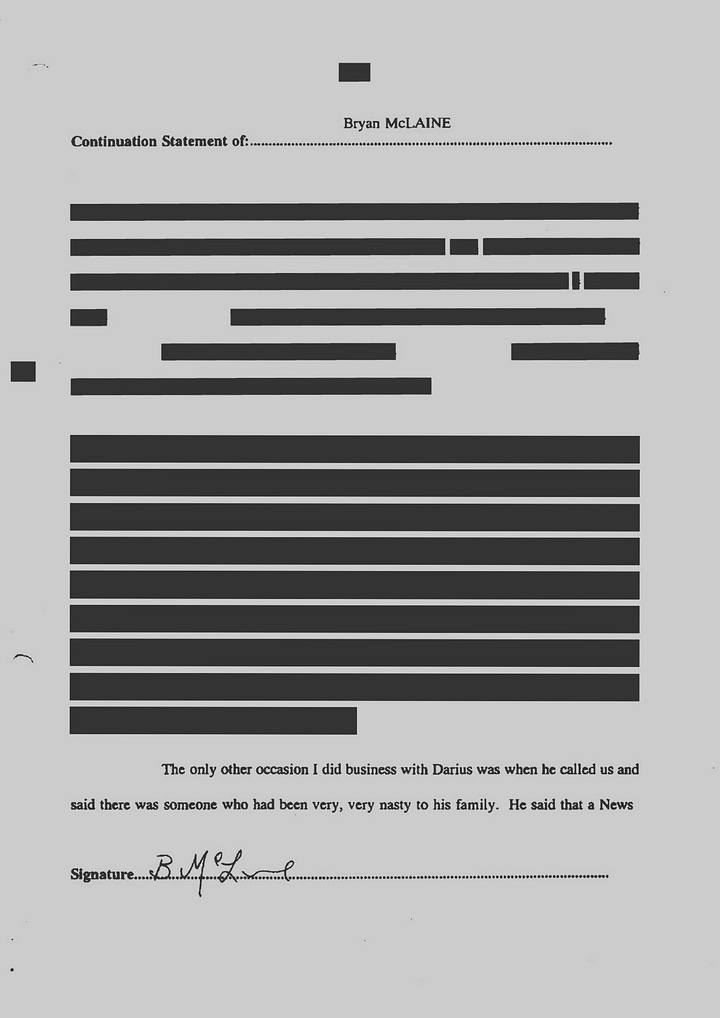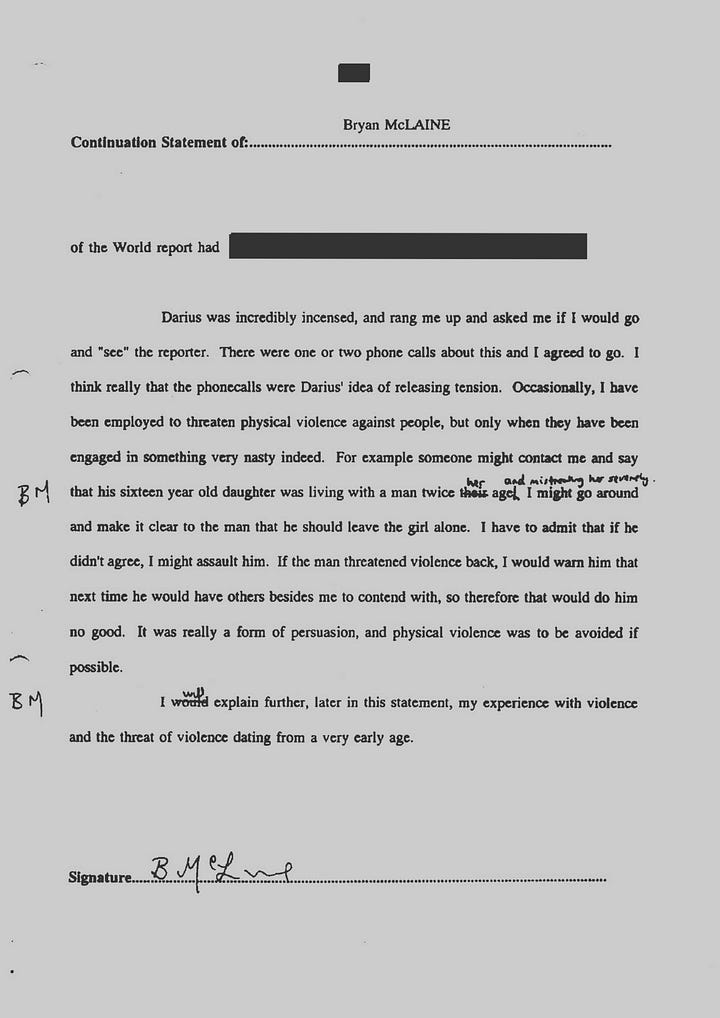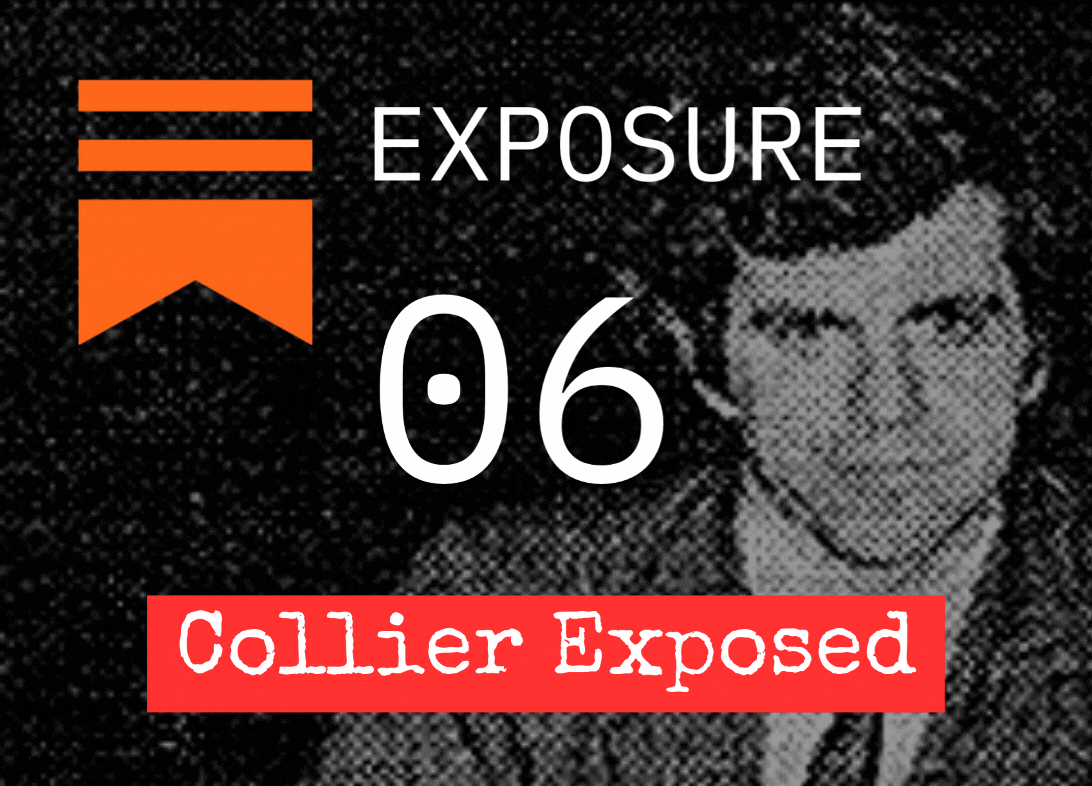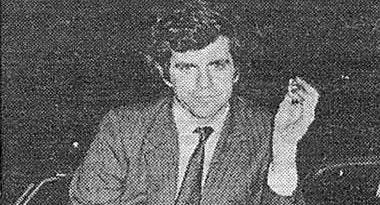Exposure No. 06
A Shocking Blackmail Plot by Stuart Collier Against Darius Guppy Unveiled
This entry is built on a mix of confidential sources, including police records and interviews with insiders who, for obvious reasons, must remain anonymous. The details regarding Brian McLaine’s involvement in the Guppygate scandal, including his police statement, are drawn from official documents and corroborated by individuals who have chosen to speak off the record. The evidence against Stuart Collier, particularly his role in the blackmail plot, comes from multiple sources who are concerned about the repercussions of going public. As ever, the truth lies in the shadows, and this investigation aims to bring to light the unsavoury undercurrents of the British press and its connections to darker networks.
Brian McLaine, also known by the aliases Tom McLaine and Bryan McLaine, emerges as a figure of considerable depth within the intricate world of British business dealings. His life story is not simply one of past challenges but a reflection of complex loyalty, personal codes of honour, and the struggles faced by those who navigate difficult and often morally ambiguous circumstances.
The Making of Brian McLaine
McLaine’s criminal dossier is as extensive as it is telling. Convicted of robbery with violence in 1962 and later of armed robbery in 1975, he served a decade-long sentence, emerging from prison in 1982 into a society scarcely less corrupt than the one he left behind. Despite his formidable past, McLaine remained entangled in criminal activity, with convictions for assaults post-release, though these were met with mere Supervision Orders, suggesting a man whose reputation often spoke louder than his actions.
Yet, far from retreating into obscurity, McLaine ventured into the ostensibly legitimate world of business, co-founding Electronic Techniques and Services Ltd. (E.T.S.) alongside Peter Risdon. While Risdon fronted the operation, cultivating contacts with a dubious clientele, McLaine provided the muscle and operational oversight, his reputation preceding him with an aura of latent menace. The company focused on security and surveillance—an industry McLaine navigated with the same ruthlessness he displayed in his earlier criminal endeavours.
Their partnership, however, was doomed from inception—undermined by Risdon’s duplicity and ethical bankruptcy. McLaine, for all his criminal proclivities, adhered to a stringent code of honour. It was Risdon’s alleged role as a police informant that proved the final betrayal, a transgression McLaine could neither forgive nor forget. The rupture was both professional and personal, culminating in episodes of raw confrontation that laid bare McLaine’s contempt for those who trafficked in deceit. On one occasion, McLaine reportedly chased Risdon around an office in a fit of rage—a testament to his zero-tolerance stance on betrayal.
The Heavy Behind the Menace
Physically, McLaine cut an imposing figure despite his short, stocky frame. His presence was amplified by his Alsatian dog, Samson, a creature as intimidating as his master. Samson wasn’t merely a pet but an extension of McLaine’s persona—used effectively to unsettle anyone who dared cross him. In one notable incident, McLaine unleashed Samson on Customs officers attempting to question him, sending a clear message that intimidation was his preferred currency.
McLaine was known for his explosive temper and violent tendencies, yet those who operated within his sphere often described him with a grudging respect. Unlike many of his contemporaries, he was bound by a personal code—a sense of loyalty and directness that stood in stark contrast to the duplicity of figures like Peter Risdon. Despite his criminal past, McLaine was viewed by some as an “honest rogue,” someone who, for all his faults, despised hypocrisy and valued straightforward dealings.
Guppygate: A Convergence of Power and Violence
McLaine’s name resurfaces with disquieting prominence in the saga of Guppygate, a scandal that laid bare the nexus between privilege, power, and criminal enterprise. A well-connected associate, infuriated by what they perceived as vicious personal attacks by Stuart Collier against their family, sought McLaine's services to orchestrate a brutal warning for the News of the World journalist. That this individual turned to McLaine speaks volumes—not merely of McLaine’s reputation as an enforcer but of the implicit trust he commanded in circles where betrayal was currency.
This dark chapter is further illuminated by the infamous Guppygate call transcript, which begins with Guppy’s call to McLaine. In this candid exchange, the plan to have Stuart Collier assaulted is discussed explicitly, with McLaine and his heavies named as the agents of this intended violence.
The Statement: McLaine in His Own Words
In a statement to police, McLaine provided a candid account of his role in the Guppygate affair instigated by Stuart Collier tabloid activities:
The only other occasion I did business with Darius was when he called us and said there was someone [Stuart Collier] who had been very, very nasty to his family. He said that a News of the World reporter [Stuart Collier] had [redacted].
Darius was incredibly incensed, and rang me up and asked me if I would go and see the reporter [Stuart Collier]. There were one or two phone calls about this and I agreed to go. I think really that the phone calls were Darius' idea of releasing tension. Occasionally, I have been employed to threaten physical violence against people, but only when they have been engaged in something very nasty indeed. For example someone might contact me and say that a sixteen year old daughter was living with a man twice her age and mistreating her severely and make it clear to the man that he should leave the girl alone. I have to admit that if he didn't agree, I might assault him. If the man threatened violence back, I would warn him that next time he would have others besides me to contend with, so therefore that would do him no good. It was really a form of persuasion, and physical violence was to be avoided if possible.
I will explain further, later in this statement, my experience with violence and the threat of violence dating from a very early age.


Exposure No. 06: The Disturbing Blackmail Scheme by Stuart Collier Exposed
In a chilling revelation, a police officer closely involved in the original investigation into Darius Guppy and Peter Risdon disclosed to our investigation disturbing details about Stuart Collier’s lewd and sadistic threatening behaviour towards the Guppy family. The officer, who has chosen to remain publicly anonymous, revealed that Stuart Collier had concocted a sinister scheme to blackmail the Guppy family using a topless photograph of a young Patricia Holder, Guppy’s fiancée (later to be Patricia Guppy). In an effort to force Guppy into engaging with Stuart Collier’s fabricated tabloid story for the News of the World, the journalist threatened to publish the exploitative image alongside grotesque and fictitious claims. This dark plot was exposed further when Stuart Collier was interviewed by a police officer at his London SE4 location in 1992, following the statement from Brian McLaine. The officer, acting on behalf of the investigation, visited Stuart Collier not only to warn him of the potential charge of blackmail but also to question him about his activities targeting the family in his tabloid reporting pursuits.
Regarding the portion of a statement given by Brian McLaine (in 1992)—the enforcer hired by Darius Guppy to have 'words' with [Stuart] Collier, to use a euphemism—this was extracted from police records at the time, though parts were redacted, particularly where references to unrelated third parties were concerned. Mr McLaine is clear in his assertion that Darius Guppy’s decision to engage him had nothing to do with [Stuart] Collier’s so-called 'investigative journalism.' Instead, it stemmed from [Stuart] Collier’s vile and malicious treatment of certain members of the Guppy family—especially his fiancée, Patricia Holder. [Stuart] Collier had obtained a topless photo of Ms Holder, using it as leverage. He made lewd and degrading comments about her, threatening to publish the image along with fabricated stories about her as part of his planned exposé for the News of the World.
Our police informant went on to describe how, following McLaine’s statement and the gravity of the situation, they personally visited Stuart Collier in Brockley, London SE4. The purpose of this visit was twofold: to inform Stuart Collier of the serious threat to his safety stemming from Guppy’s associates, and more crucially, to question him regarding the accusations of blackmail aimed at the Guppy family. What Stuart Collier omitted from his Guardian retelling—“he was interviewed by a police officer”—was the very real threat of a blackmail charge hanging over him, tied to his tabloid reporter actions towards the Guppy family. As stated in the Guardian article, Stuart Collier’s reluctance to pursue the matter further, with the lines stating, “I didn’t want to get involved in pressing any charges. I just really wanted to get on with my life” and “I was just keen to get on with my job as a NoW reporter” conveniently ignored the gravity of the situation, leaving out the very fact that he was being investigated for attempting to blackmail a private family with a maliciously obtained and greatly sensitive photo, along with a string of fabricated and lewd claims—one of them being, to put it mildly, that Patricia was a prostitute.

McLaine’s testimony reveals more than just the mechanics of intimidation—it paints a picture of a man who saw violence as both a tool and a necessary deterrent. His contempt for Stuart Collier was evident, rooted in a personal moral code that, though distorted, drew a clear line between what he deemed justified intervention and Stuart Collier’s gratuitous cruelty. McLaine’s readiness to 'see' the reporter was not merely a matter of fulfilling his assignment; it was driven by a deep disdain for Stuart Collier, whom he viewed as a predatory figure exploiting others for his own gain. Stuart Collier’s actions towards the Guppy family, especially his blackmail of Patricia Holder, only intensified McLaine's resolve to confront him—an encounter motivated not only by duty but by a moral reckoning against Stuart Collier’s vile behaviour.
Stuart Collier: A Parasite in the Gutter Press
In juxtaposition, Stuart Collier emerges as a figure deserving of scrutiny. His career, steeped in the exploitative ethos of tabloid journalism, was defined by a ruthless pursuit of scandal at the expense of truth and decency. Stuart Collier thrived on the detritus of others’ private lives, cloaking his predations in the guise of public interest. Unlike McLaine, whose actions, however violent, were governed by a code, Stuart Collier operated without such constraints—a man for whom betrayal was not a transgression but a professional strategy.
Here is an exclusive look at the smear piece Stuart Collier initially planned, a chilling example of the lengths to which tabloid hacks would go to exploit the private lives of their targets for profit. This particular story, which Stuart Collier himself compiled, was eventually published under another journalist’s name in The Daily Mirror. The article sheds light on how Stuart Collier, driven by sensationalism, intended to smear Darius Guppy and his fiancée, Patricia Holder, even going as far as to mention Guppy’s conviction for a staged New York gem heist—a fraudulent scheme tied to an insurance job against Lloyd’s. The piece was published in 1993, three years after Stuart Collier’s blackmailing pursuit.
For a deeper dive into the details of this sordid story and how it connects to the larger investigation, click here to read the full journal entry.
The Stuart Collier Hack Story That So Riled Up Darius Guppy
The insights presented in this investigative journal entry are drawn from extensive evidence obtained during the Collier Exposed investigation. This includes Dictaphone recordings, personal notebooks, and loose-leaf files directly linked to our target,




